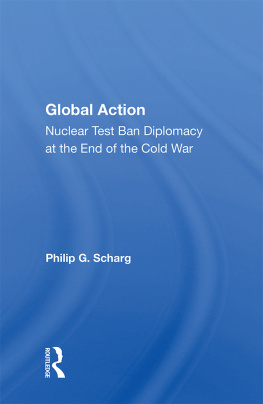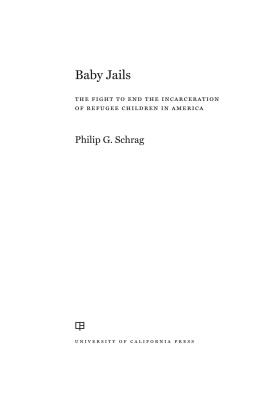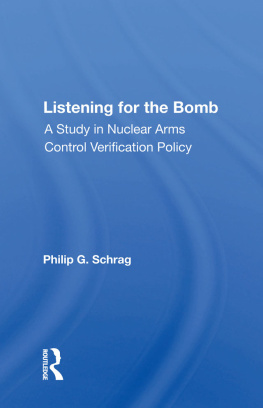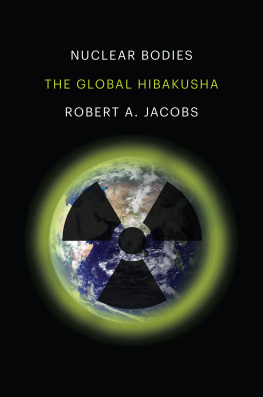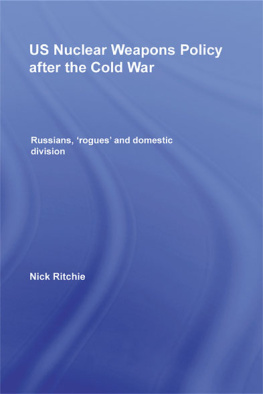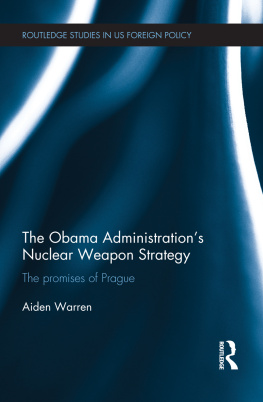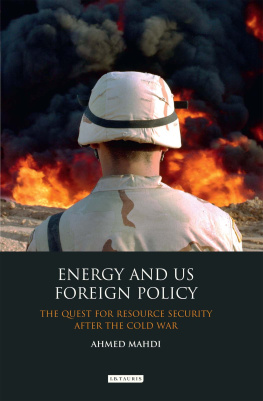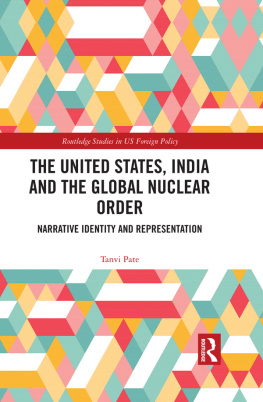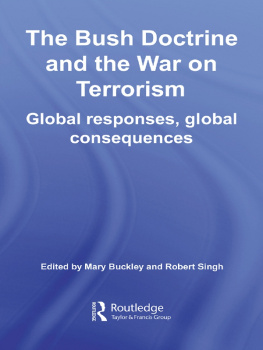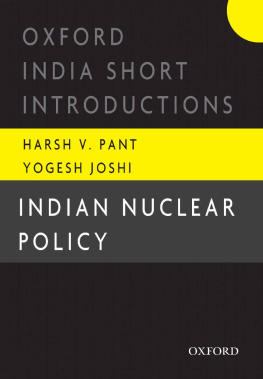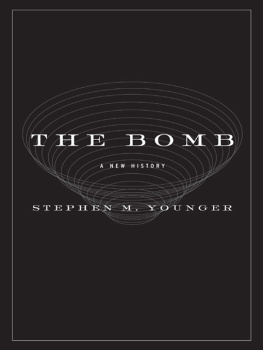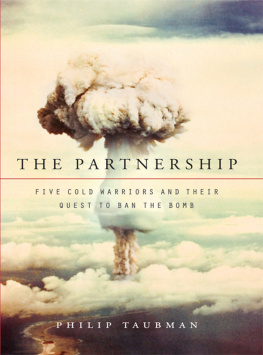Global Action
Global Action
Nuclear Test Ban Diplomacy at the End of the Cold War
Philip G. Schrag
First published 1992 by Westview Press, Inc.
Published 2018 by Routledge
52 Vanderbilt Avenue, New York, NY 10017
2 Park Square, Milton Park, Abingdon, Oxon OX14 4RN
Routledge is an imprint of the Taylor & Francis Group, an informa business
Copyright 1992 Taylor & Francis
All rights reserved. No part of this book may be reprinted or reproduced or utilised in any form or by any electronic, mechanical, or other means, now known or hereafter invented, including photocopying and recording, or in any information storage or retrieval system, without permission in writing from the publishers.
Notice:
Product or corporate names may be trademarks or registered trademarks, and are used only for identification and explanation without intent to infringe.
Library of Congress Cataloging-in-Publication Data
Schrag, Philip G., 1943
Global action: nuclear test ban diplomacy at the end of the Cold
War / Philip G. Schrag.
p. cm.
Includes bibliographical references and index.
ISBN 0-8133-1112-8
1. Nuclear weaponsTesting. 2. Nuclear arms control. I. Title.
JX1974.7.S23 1992
327.1'74dc20 92-60
CIP
ISBN 13: 978-0-367-00387-6 (hbk)
To the people who work for nuclear arms control and disarmament in governments, parliaments, and citizen organizations throughout the world
I deeply appreciate the assistance of many people who cooperated with my research, including Olafur Ragnar Grimsson, Kennedy Graham, and Aaron Tovish of Parliamentarians for Global Action; Bernard Lown, Bill Monning, and Norm Stein of International Physicians for the Prevention of Nuclear War; the many diplomats who filled me in on behind-the-scenes negotiations; William Epstein, who helped me with the historical background; Tom Zamora, who allowed me to consult his archival material on the Fourth NPT Review Conference; Frank Polek, who provided able research assistance; and Victor Navasky, who helped me to obtain a United Nations press pass.
I am also very grateful to Georgetown University Law Center and the Ford Foundation, which provided generous grants to make the writing of this book possible.
And Lisa, I thank you for encouraging me at all the right times.
Philip G. Schrag
Georgetown University Law Center
- AEC Atomic Energy Commission
- CD Conference on Disarmament (the forty-nation group that meets twice a year in Geneva to discuss disarmament issues)
- CTB Comprehensive Test Ban
- CTBT Comprehensive Test Ban Treaty
- IPPNW International Physicians for the Prevention of Nuclear War
- kt kilotons (a measure of the explosive yield of a nuclear weaponthe bomb that destroyed Hiroshima had a yield of about 15 kt)
- NPT Non-Proliferation Treaty
- PGA Parliamentarians for Global Action
- PTBT Partial Test Ban Treaty (known as the Limited Test Ban Treaty in the United States)
- PWO Parliamentarians for World Order (original name of PGA)
- TTBT Threshold Test Ban Treaty
- U.K. United Kingdom
- U.N. United Nations
- UNGA United Nations General Assembly
- U.S. United States
- USSR Union of Soviet Socialist Republics
For the convenience of readers, I have employed the acronym "PGA" to refer to the organization that organized the drive for the Partial Test Ban Treaty Amendment Conference. Parliamentarians for Global Action never refers to itself by this or any other acronym.
We are all used to reading newspaper stories that quote unidentified "sources." Journalists sometimes decry government officials' insistence on not being quoted by name, but faced with the choice between quoting an "authoritative source" or foregoing a story, virtually all of them will accede to the conditions imposed on them.
For an academic writer, an officials insistence on anonymity is even more problematic, and for a law professor, such a demand is at odds with a strong tradition. Law professors are accustomed to meticuloussome would say excessivefootnoting to support every assertion and are generally loathe to make any claim that cannot be independently checked by reference to documentation or at least by re-interviewing a person who made an oral statement.
While I would have preferred not to relax these traditional standards, it would not have been possible to recount the history of the Partial Test Ban Treaty Amendment Conference without relying on sources who could not allow themselves to be identified. Many of the meetings leading up to and during the conference were held behind closed doors and without any documentary records, and while many of the relevant officials were quite willing to cooperate on a historical project they would not have been able to obtain authorization from their governments or organizations to be quoted by name. Like a member of the working press, I was required to honor their insistence on anonymity or to forego the full story. I chose a more complete narrative rather than a fully documented silhouette of the event.
I would have preferred as well not to have had to use the convention of referring to nations as though they were individual persons, as in the sentence, "Nigeria favored negotiation of a comprehensive test ban." In his great work Essence of Decision, Professor Graham Allison showed that such claims are only a shorthand and conceal the rich texture of bureaucratic and interpersonal conflict that inheres in much national security policymaking. This book might have explained more if it had been possible to expose and to study internal conflicts within the many governments that have expressed views on ending nuclear testing. A deeper exposition of such disputes was never a possibility, however, given the large number of governments involved, the relative lack of media attention to the nuclear-testing issue, and the understandable reluctance of governments to air their internal disagreements.
Notes
. Arthur D. Austin, "Footnote Skulduggery and Other Bad Habits," U. of Miami L. Rev., vol 40, p. 1009 (1990).
. Graham T. Allison, Essence of Decision (Boston: Little, Brown, and Co., 1971).
. Philip G. Schrag, Listening for the Bomb: A Study in Nuclear Arms Control Verification Policy (Boulder: Westview Press, 1989).
Between July 16, 1945, and July 16, 1991, six countries detonated at least 1919 nuclear explosions.
During most of the atomic age, dozens of national governments, along with several non-governmental peace movements, have sought to persuade the countries with nuclear explosive technology to stop testing these weapons. Indeed, the cessation of nuclear testing was the first concrete goal articulated by the postwar peace movement in the United States, The international demand to stop testing reached a crescendo in the early 1960's, when fallout from atmospheric tests threatened public health throughout the world.
After the Partial Test Ban Treaty of 1963 led the United States and the Soviet Union to move their tests underground, the public clamor to stop nuclear testing subsided, but it did not end. Calls for a complete halt in nuclear testinga negotiated "comprehensive test ban"continued to be made by governments, international organizations and citizen groups; in 1990 a senior United Nations official could note that "no other item on the disarmament agenda has attracted so much attention and persistent efforts as the achievement of a comprehensive test ban," a goal that still had not been achieved.

